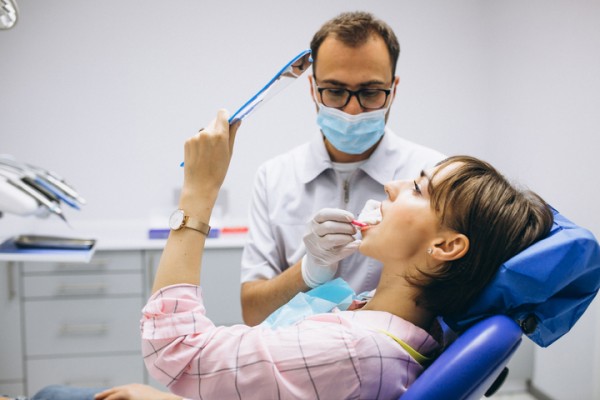3 Ways To Deal With Bad Breath Caused by Face Masks

To avoid bad breath, have your teeth cleaned every three or four months, instead of every half-a-year, to eliminate the stinky bugs.
Who would have thought bad breath would be on top of the reasons for annoyances of wearing a face mask?
According to the Academy of General Dentistry, a condition an individual may suffer from "chronic halitosis," an illness in which one may not be able to sniff out on their own usually.
Gregory Levitin, MD, from the New York City-based Eye and Ear Infirmary of Mount Sinai said that the face masks that we wear to avoid COVID-19 might bring and cover our mouth and nose "create a closed or contained air pocket, which collects our breath and reintroduces" smell back into our nose.
Not only that, if you've had even just a mild bad breath before, your condition could be worsened by "chronic mask-wearing."
Here are 3 Ways to Handle 'Bad Breath'
According to Oral Surgery & Dental Implant Specialists of San Diego oral surgeon and dentist, Paul Koshgerian, DMD, MD, we tend to breathe through our mouth instead of our nose when we wear a mask.
He also said that could result in a decrease in saliva production, which helps maintain a "healthy balance in our mouth, clean our teeth" and help deal with bad bacteria. And when that balance gets interrupted, it can then lead to bad breath.
Below are some tips you can try to manage bad breath:
1. Brush Your Teeth Regularly
Dr. Koshgerian said, if you are not taking care of your teeth, you encourage the building up of bacteria that naturally stay in your mouth.
Experts recommend the brushing of teeth twice each day, with toothpaste that has fluoride content. It is recommended too. The oral surgeon and dentist also said that you should clean between your teeth every day using floss.
Brushing the tongue, specifically the back of it, helps remove the bacteria that add to the stinky odors.
You may also use over-the-counter mouthwashes to help you alleviate bad breath. When buying mouthwash, make sure to opt for the one with an antibacterial ingredient like "cetylpyridinium chloride."
DON'T MISS THIS: 10-Year-Old Diabetes Patient Has a Newfound Buddy in His Diabetic Alert Dog
2. Frequently Wash Your Face Mask
According to Dr. Levitin, when wearing a mask, "Respiratory particles" that come from your breath land on it and can ultimately lead to foul odor.
More so, like any other piece of clothing, your cloth-made mask needs to be cleaned regularly. Ideally, masks are washed every day.
You can wash your mask along with your regular laundry, or if you are washing by hand, simply soak the mask in bleach and let it stay for five minutes. Rinse it after thoroughly with water.
3. Set an Appointment with Your Dentist to Discuss Your Condition
A 2015 study published in the Journal of the International Society of Preventive and Community Dentistry said that up to 80 percent of individuals with gum disease have bad breath, too.
The same bacteria found on teeth and tums, Dr. Koshgerian, explained, causing bad breath also leads to tooth decay and gum disease.
If you allow your gums to stay untreated, it will pull away from your teeth, leaving spaces in which odor-causing bacteria can penetrate.
To avoid this from happening, you may do some cleaning more frequently. For instance, have your teeth cleaned every three or four months, instead of every half-a-year, to eliminate the stinky bugs.
IN CASE YOU MISSED THIS: Facebook Group Donates to Celebrate Little Boy's 4th Birthday Before His 8th Surgery
Check out more news and information on Oral Health on MD News Daily.
Oct 02, 2020 07:20 AM EDT





